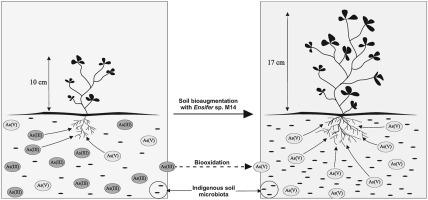当前位置:
X-MOL 学术
›
Environ. Pollut.
›
论文详情
Our official English website, www.x-mol.net, welcomes your
feedback! (Note: you will need to create a separate account there.)
Enhancing the plants growth and arsenic uptake from soil using arsenite-oxidizing bacteria.
Environmental Pollution ( IF 7.6 ) Pub Date : 2020-05-03 , DOI: 10.1016/j.envpol.2020.114692 Klaudia Debiec-Andrzejewska 1 , Tomasz Krucon 1 , Katarzyna Piatkowska 1 , Lukasz Drewniak 1
Environmental Pollution ( IF 7.6 ) Pub Date : 2020-05-03 , DOI: 10.1016/j.envpol.2020.114692 Klaudia Debiec-Andrzejewska 1 , Tomasz Krucon 1 , Katarzyna Piatkowska 1 , Lukasz Drewniak 1
Affiliation

|
Plants, that naturally inhabit arsenic-contaminated areas may be used for effective arsenic-uptake from soil. The efficiency of this process may be increased by the reducing arsenic phytotoxicity and stimulating the activity of indigenous soil microbiota. As we showed, it can be achieved by the bioaugmenting of soil with arsenite-oxidizing bacteria (AOB). This study aimed to investigate the influence of soil bioaugmentation with AOB on the structure, quantity, and activity of the indigenous soil microbiota as well as to estimate the effect of such changes on the morphology, growth rate, and arsenic-uptake efficiency of plants. Plants-microbes interactions were investigated using the effective arsenites oxidizer Ensifer sp. M14 and the native plant alfalfa. The experiments were performed both in potted garden soil enriched with arsenic and in highly arsenic polluted, natural soil. The presence of M14 strain in soil contributed to the increase both in plants growth intensity and arsenic-uptake efficiency with regard to the soil without M14. After 40 days of plants culture, their average biomass increased by about 60% compared to non-bioaugmented soil, while the arsenic accumulation increased more than two times. The soil bioaugmentation contributed also to the increase in the quantity and activity of soil microorganisms without disturbing the natural microbial community structure. In the bioaugmented soil, the noticable increase in the quantity of heterotrophic, denitrifying, nitrifying and cellulolytic bacteria as well as in the activity of dehydrogenases and cellulases were observed. Soil bioaugmentation with M14 enables the application of native and commonly occurring plant species for enhancing the treatment of arsenic-contaminated soil. This in situ strategy may constitute a valuable alternative both to the chemical and physical methods of arsenic removal from soil and to the biological ways based on the arsenic hyperaccumulating plants and/or the arsenic mobilizing bacteria.
中文翻译:

使用亚砷酸盐氧化细菌增强植物从土壤中的生长和砷的吸收。
自然生活在受砷污染的地区的植物可用于有效吸收土壤中的砷。减少砷的植物毒性并刺激土著土壤微生物的活动可能会提高这一过程的效率。正如我们所展示的,可以通过亚砷酸盐氧化细菌(AOB)对土壤的生物强化来实现。这项研究的目的是调查AOB对土壤生物强化的影响,对原生土壤微生物群的结构,数量和活性,并估计这种变化对植物形态,生长速率和砷吸收效率的影响。使用有效的砷氧化物氧化剂Ensifer sp研究了植物与微生物的相互作用。M14和本地植物苜蓿。该实验在富含砷的盆栽花园土壤和高砷污染的天然土壤中进行。与不含M14的土壤相比,土壤中M14菌株的存在有助于植物生长强度和砷吸收效率的提高。在植物培养40天后,它们的平均生物量比非生物增强的土壤增加了约60%,而砷的积累增加了两倍以上。土壤的生物强化作用还有助于增加土壤微生物的数量和活性,而不会干扰自然的微生物群落结构。在生物强化的土壤中,观察到异养,反硝化,硝化和纤维素分解细菌的数量以及脱氢酶和纤维素酶的活性显着增加。使用M14进行土壤生物强化可以应用天然和常见的植物物种来增强对砷污染土壤的处理。这种原位策略可以构成从土壤中去除砷的化学和物理方法以及基于砷超富集植物和/或砷移动性细菌的生物方法的有价值的替代方法。
更新日期:2020-05-03
中文翻译:

使用亚砷酸盐氧化细菌增强植物从土壤中的生长和砷的吸收。
自然生活在受砷污染的地区的植物可用于有效吸收土壤中的砷。减少砷的植物毒性并刺激土著土壤微生物的活动可能会提高这一过程的效率。正如我们所展示的,可以通过亚砷酸盐氧化细菌(AOB)对土壤的生物强化来实现。这项研究的目的是调查AOB对土壤生物强化的影响,对原生土壤微生物群的结构,数量和活性,并估计这种变化对植物形态,生长速率和砷吸收效率的影响。使用有效的砷氧化物氧化剂Ensifer sp研究了植物与微生物的相互作用。M14和本地植物苜蓿。该实验在富含砷的盆栽花园土壤和高砷污染的天然土壤中进行。与不含M14的土壤相比,土壤中M14菌株的存在有助于植物生长强度和砷吸收效率的提高。在植物培养40天后,它们的平均生物量比非生物增强的土壤增加了约60%,而砷的积累增加了两倍以上。土壤的生物强化作用还有助于增加土壤微生物的数量和活性,而不会干扰自然的微生物群落结构。在生物强化的土壤中,观察到异养,反硝化,硝化和纤维素分解细菌的数量以及脱氢酶和纤维素酶的活性显着增加。使用M14进行土壤生物强化可以应用天然和常见的植物物种来增强对砷污染土壤的处理。这种原位策略可以构成从土壤中去除砷的化学和物理方法以及基于砷超富集植物和/或砷移动性细菌的生物方法的有价值的替代方法。





















































 京公网安备 11010802027423号
京公网安备 11010802027423号